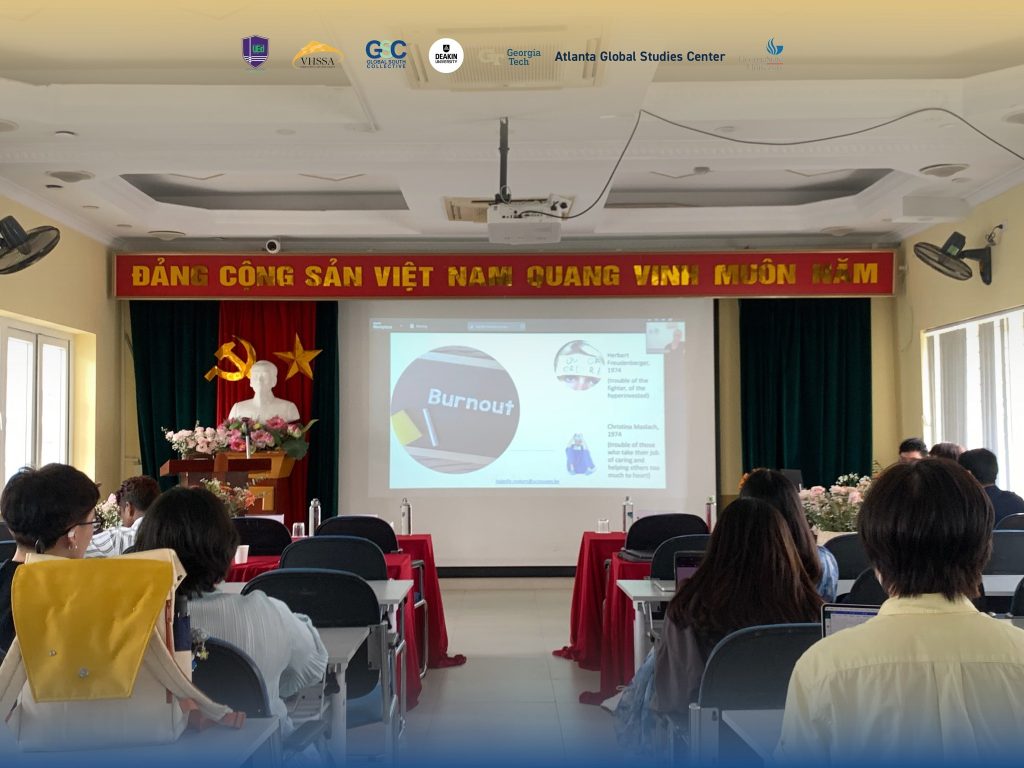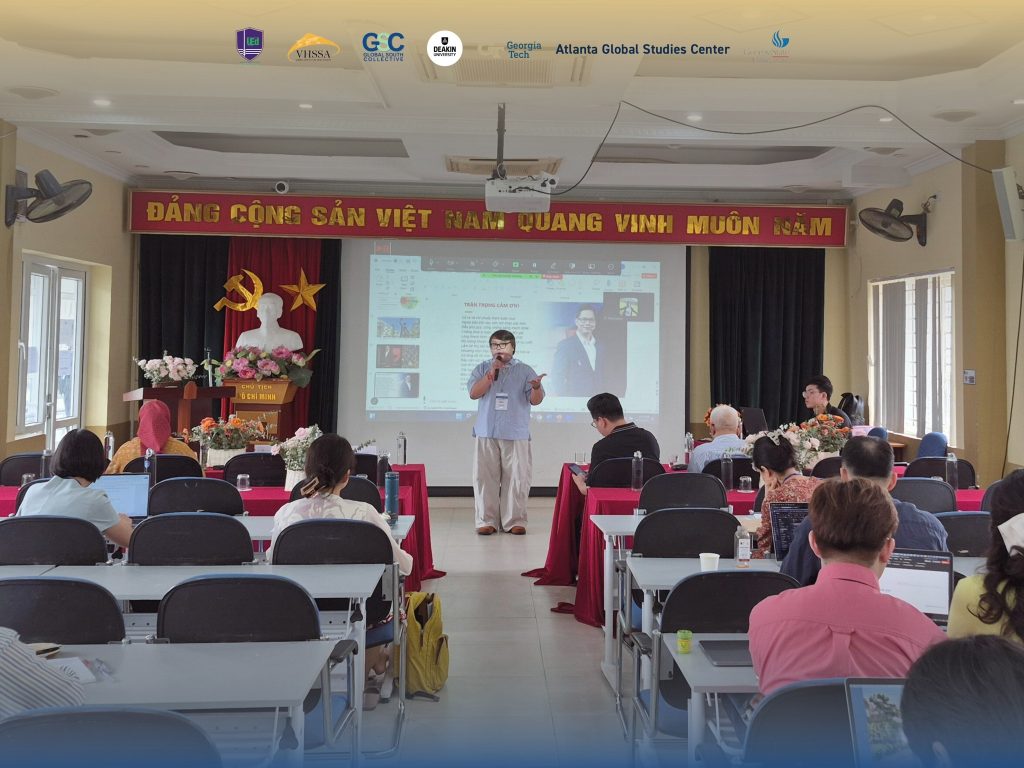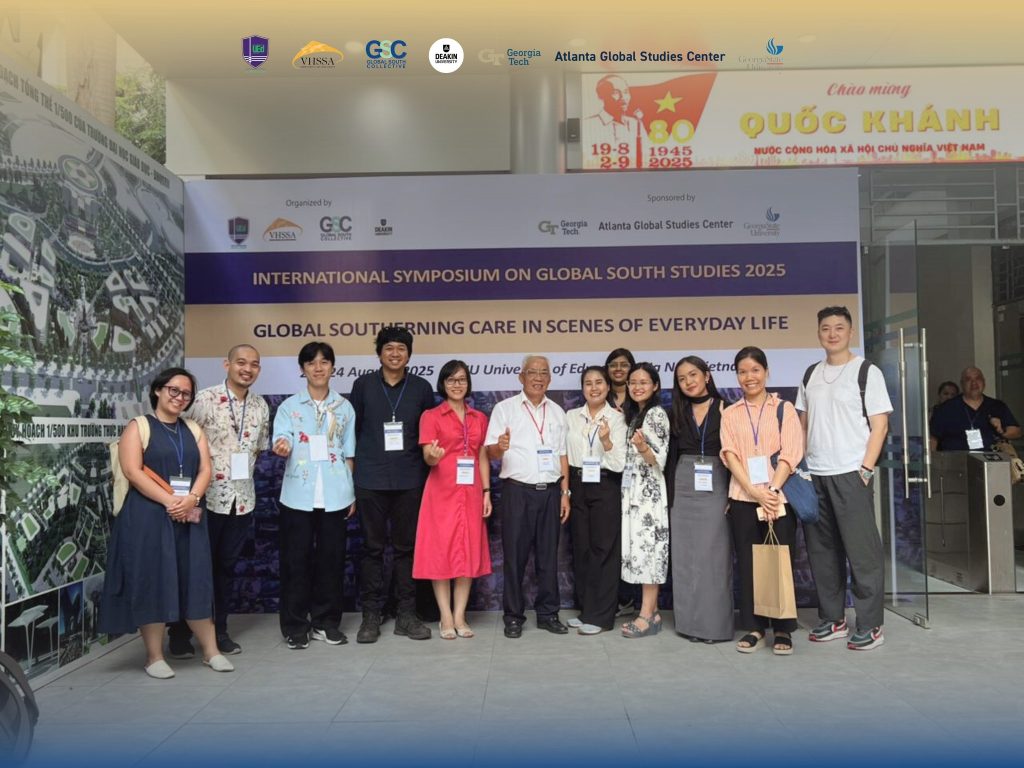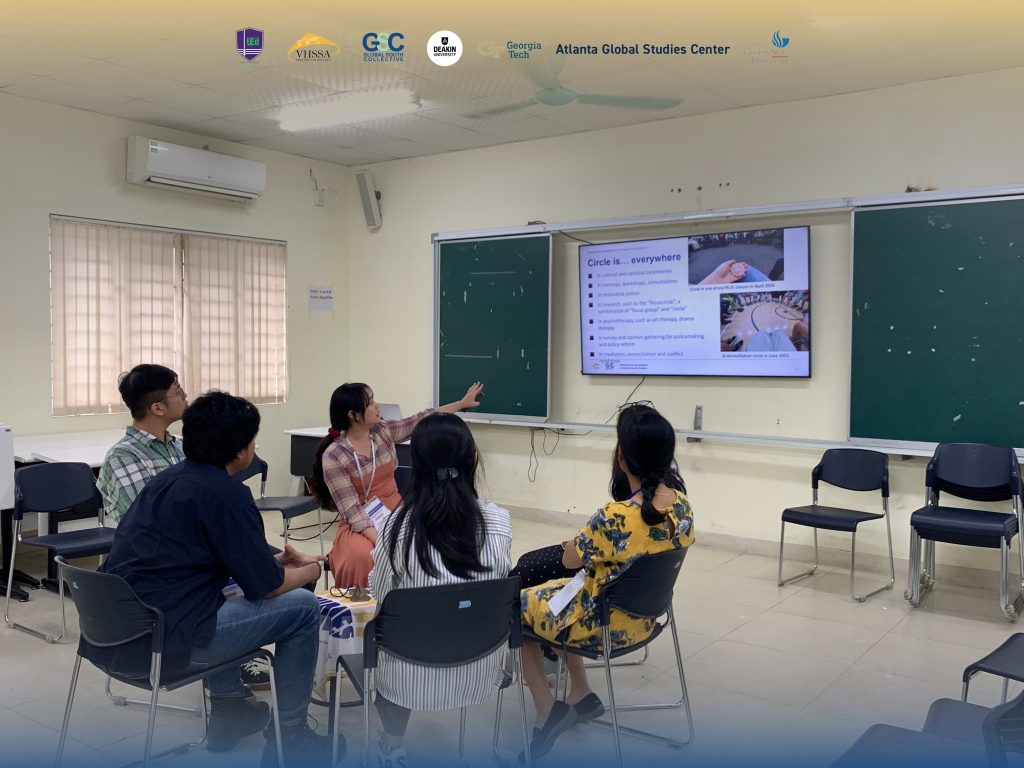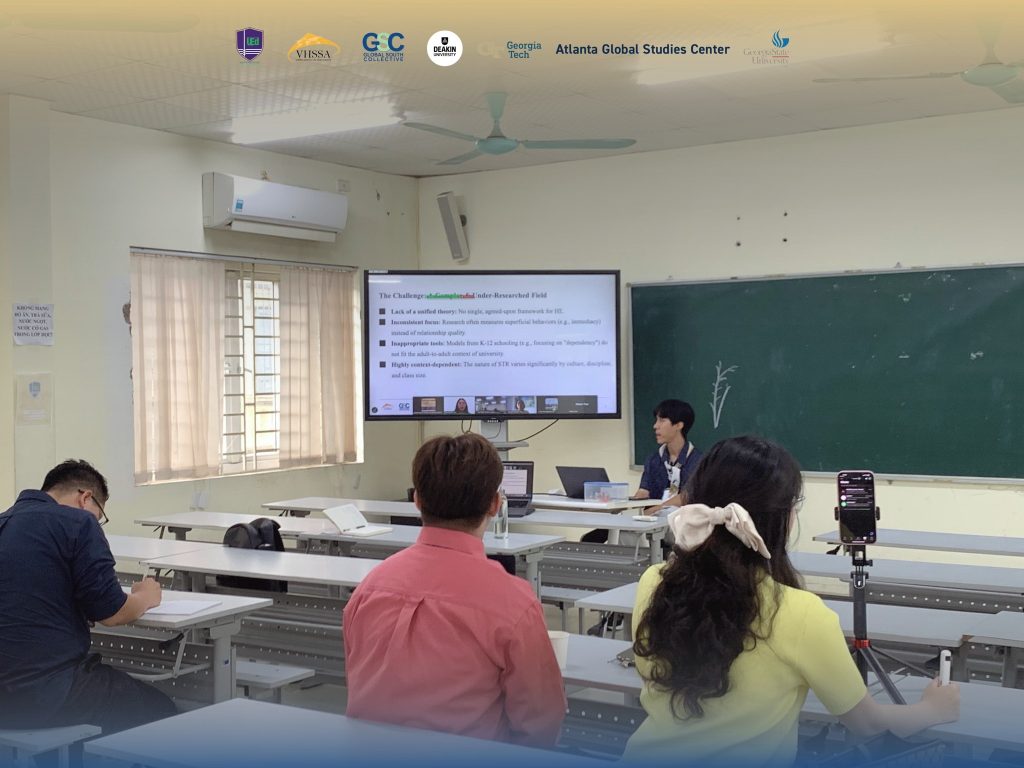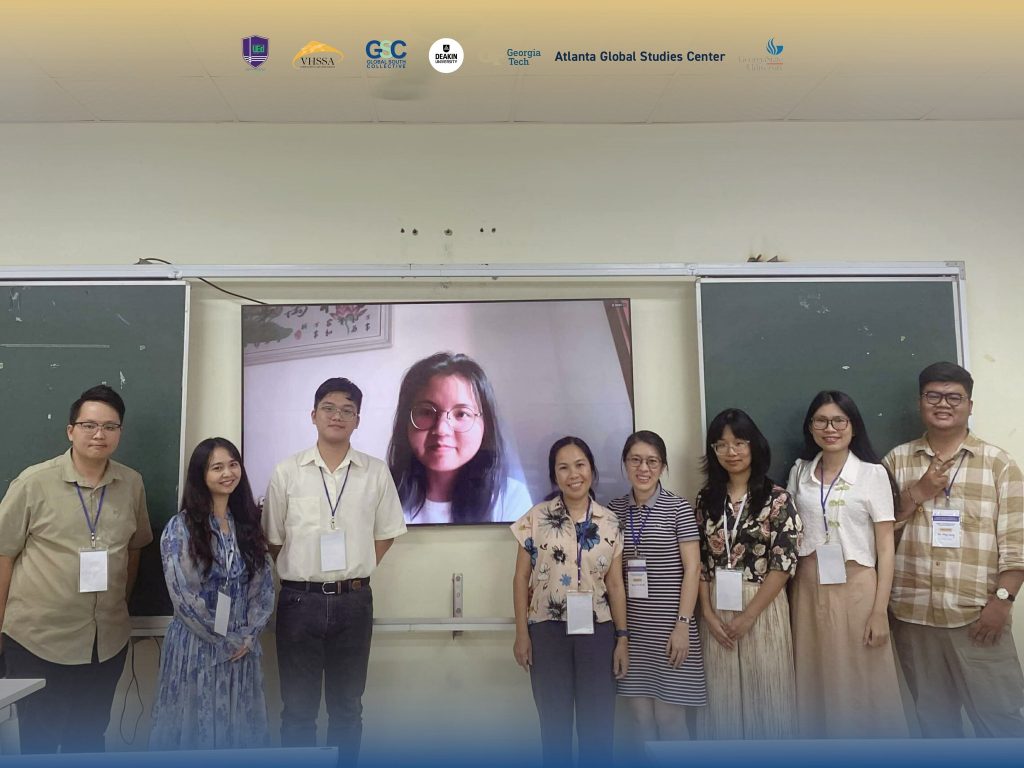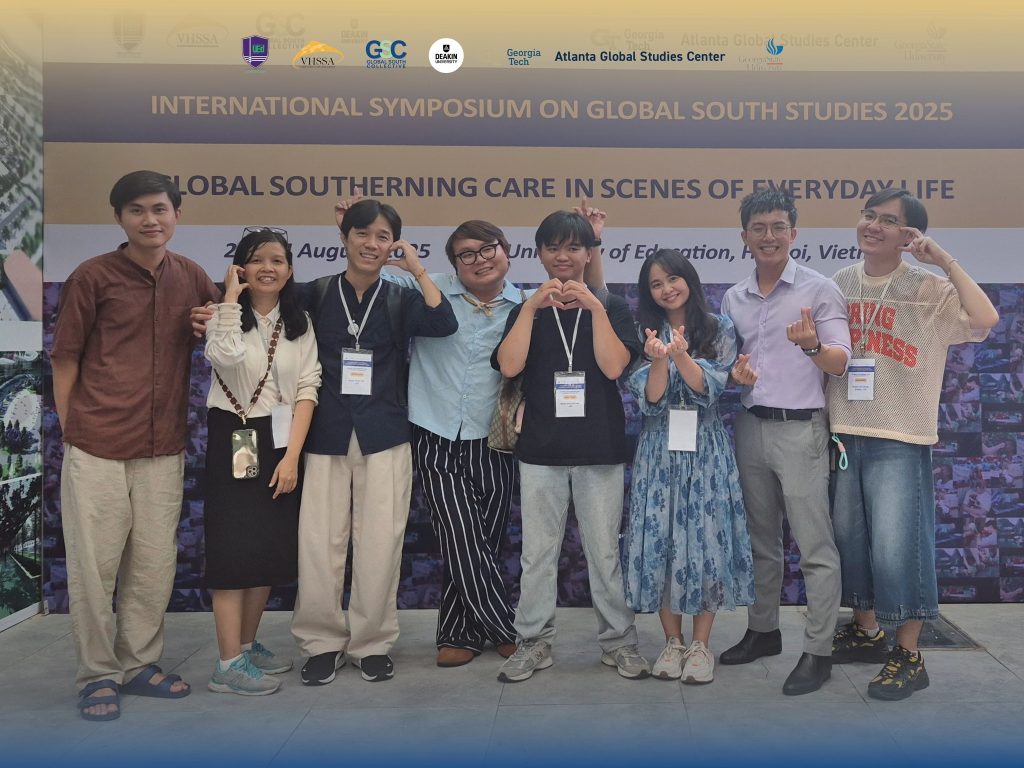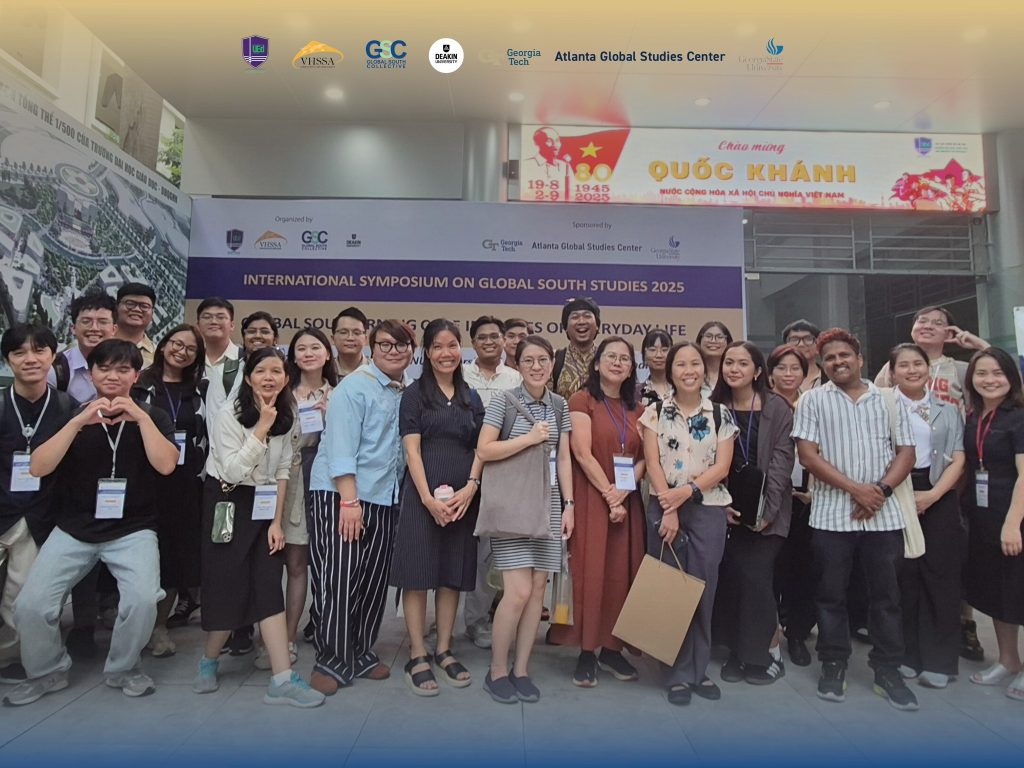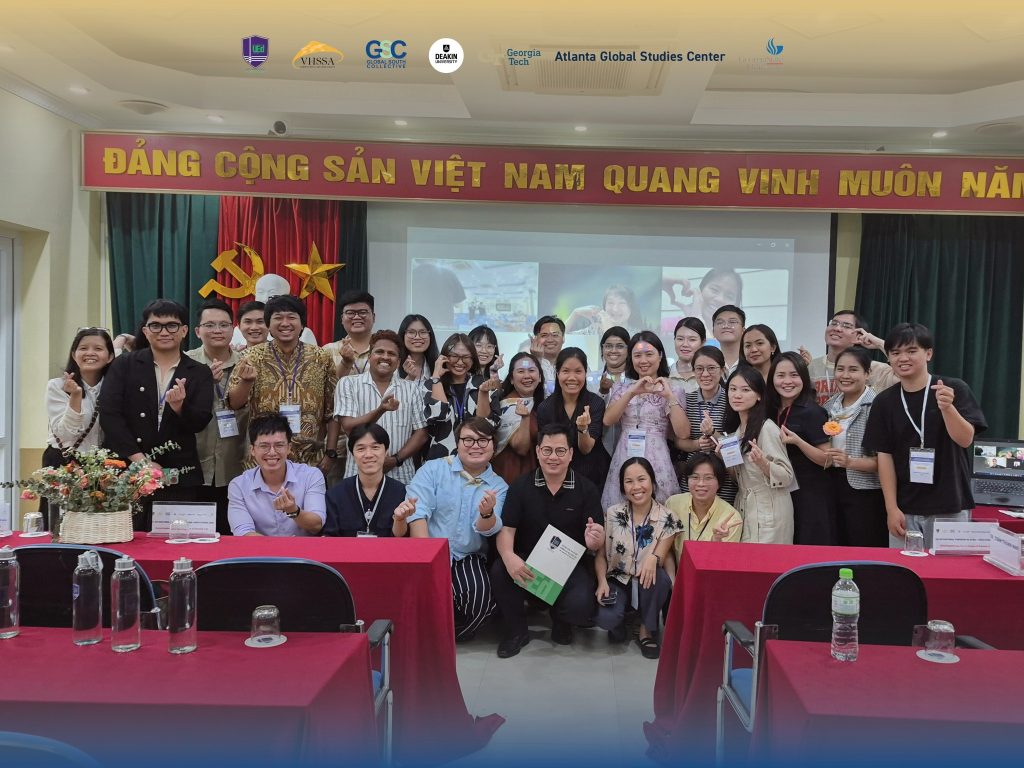DAY ONE OF THE GLOBAL SOUTH STUDIES INTERNATIONAL SYMPOSIUM 2025
The opening day of the symposium set the stage for inspiring dialogues around the theme Global-Southerning Care in Scenes of Everyday Life.![]() The morning began with welcome and opening remarks from Assoc. Prof. Dr. Tran Thanh Nam (VNU-University of Education, Hanoi), Dr. Le Nguyen Hoang Giang (Thompson Rivers University, Canada), and Dr. Ethan Trinh (Georgia State University, USA). Their reflections emphasized the importance of expanding interdisciplinary, multilingual, and multi-contextual academic spaces to explore the philosophies and practices of Care in the Global South.
The morning began with welcome and opening remarks from Assoc. Prof. Dr. Tran Thanh Nam (VNU-University of Education, Hanoi), Dr. Le Nguyen Hoang Giang (Thompson Rivers University, Canada), and Dr. Ethan Trinh (Georgia State University, USA). Their reflections emphasized the importance of expanding interdisciplinary, multilingual, and multi-contextual academic spaces to explore the philosophies and practices of Care in the Global South.![]() Following that, this year’s keynote speaker, Prof. Hong Bui (VinUniversity, Vietnam), delivered an address on “Philosophy of Care in Education in the Age of Uncertainty and Complexity.” The lecture provoked thoughtful reflections on the role of care philosophy in education within today’s rapidly changing and unpredictable context, shaped by the digital era and artificial intelligence.
Following that, this year’s keynote speaker, Prof. Hong Bui (VinUniversity, Vietnam), delivered an address on “Philosophy of Care in Education in the Age of Uncertainty and Complexity.” The lecture provoked thoughtful reflections on the role of care philosophy in education within today’s rapidly changing and unpredictable context, shaped by the digital era and artificial intelligence.![]() The symposium continued with an online special lecture by Prof. Ly Tran (Deakin University, Australia) on “Care for International Students,” which explored aspects of care, support, and accompaniment for international students—an especially significant topic amid the globalization of education.
The symposium continued with an online special lecture by Prof. Ly Tran (Deakin University, Australia) on “Care for International Students,” which explored aspects of care, support, and accompaniment for international students—an especially significant topic amid the globalization of education.![]() In the afternoon, the symposium opened a diverse academic exchange space. Presentations examined multiple dimensions of Care, ranging from memory, migration, and Vietnamese diasporic communities to the lived experiences of Filipino migrant workers through friendship, food sharing, and emotional labor in long-term care in Japan and Hong Kong. Parallel to these sessions, Dr. Ethan Trinh led a special session titled “The Project of Happiness in the Global South: A Collective Walking Meditation.” This unique combination of academic sharing and walking meditation practice allowed participants to connect directly with the spirit of Care in a communal and deeply human way.
In the afternoon, the symposium opened a diverse academic exchange space. Presentations examined multiple dimensions of Care, ranging from memory, migration, and Vietnamese diasporic communities to the lived experiences of Filipino migrant workers through friendship, food sharing, and emotional labor in long-term care in Japan and Hong Kong. Parallel to these sessions, Dr. Ethan Trinh led a special session titled “The Project of Happiness in the Global South: A Collective Walking Meditation.” This unique combination of academic sharing and walking meditation practice allowed participants to connect directly with the spirit of Care in a communal and deeply human way.
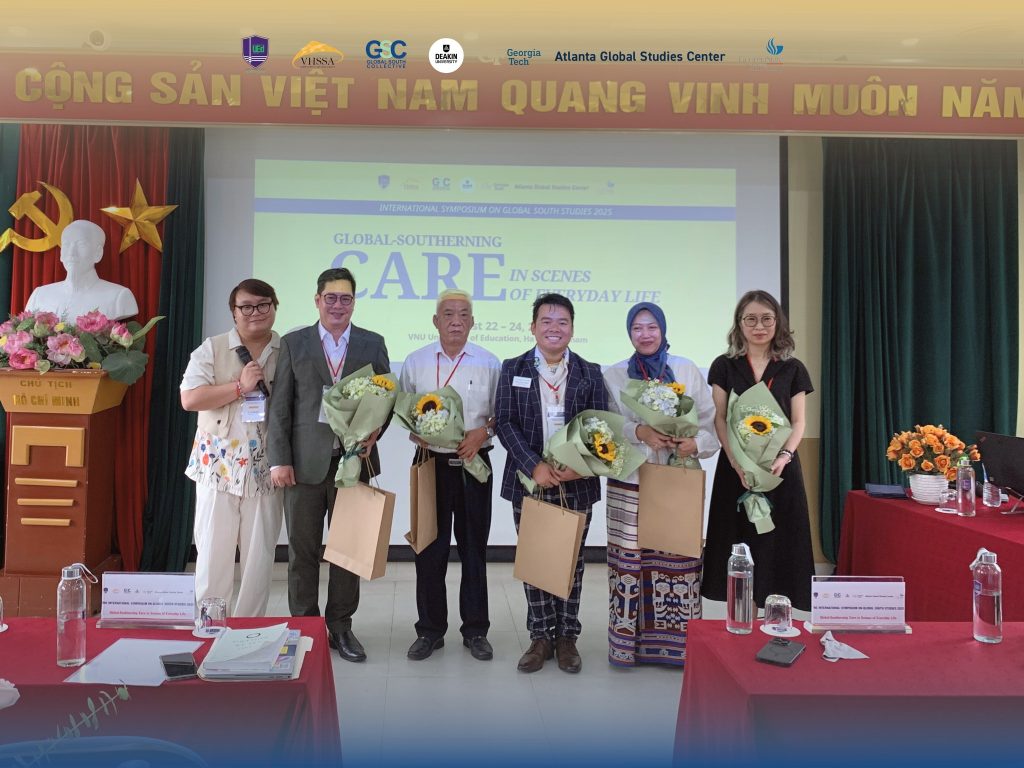
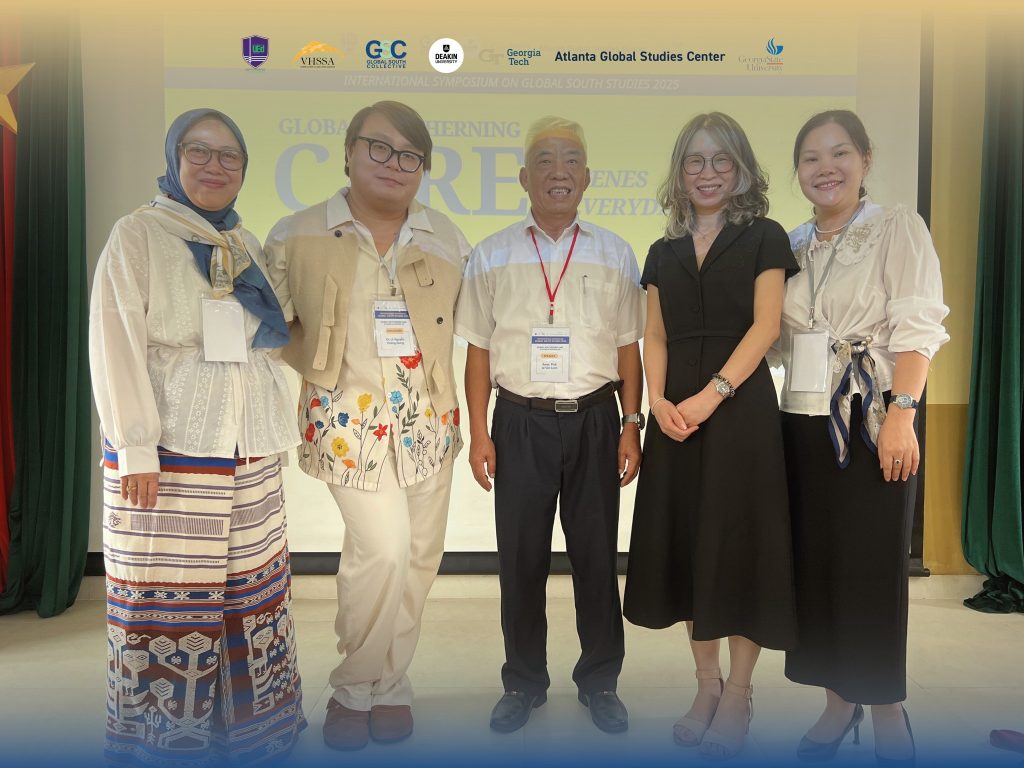
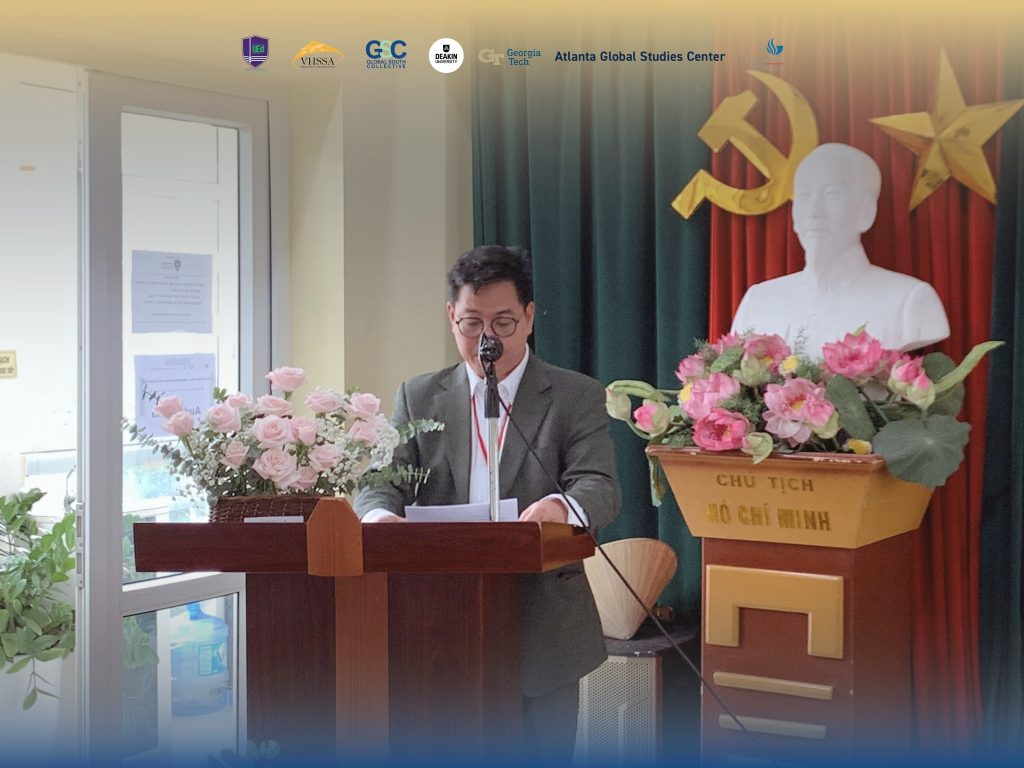
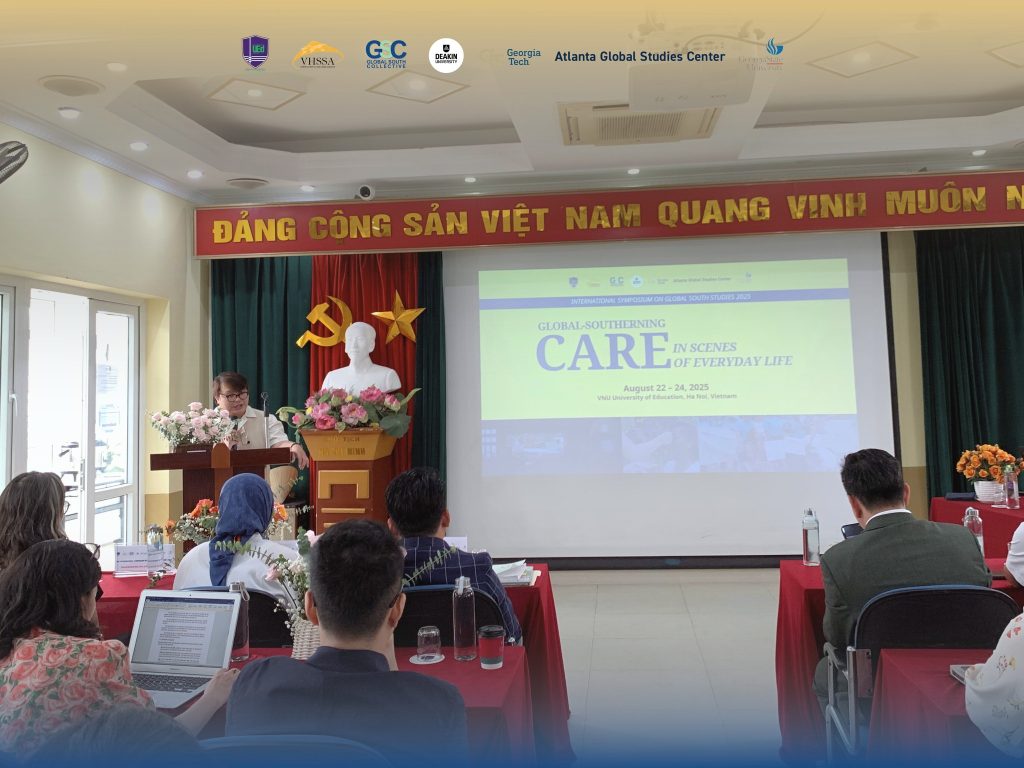
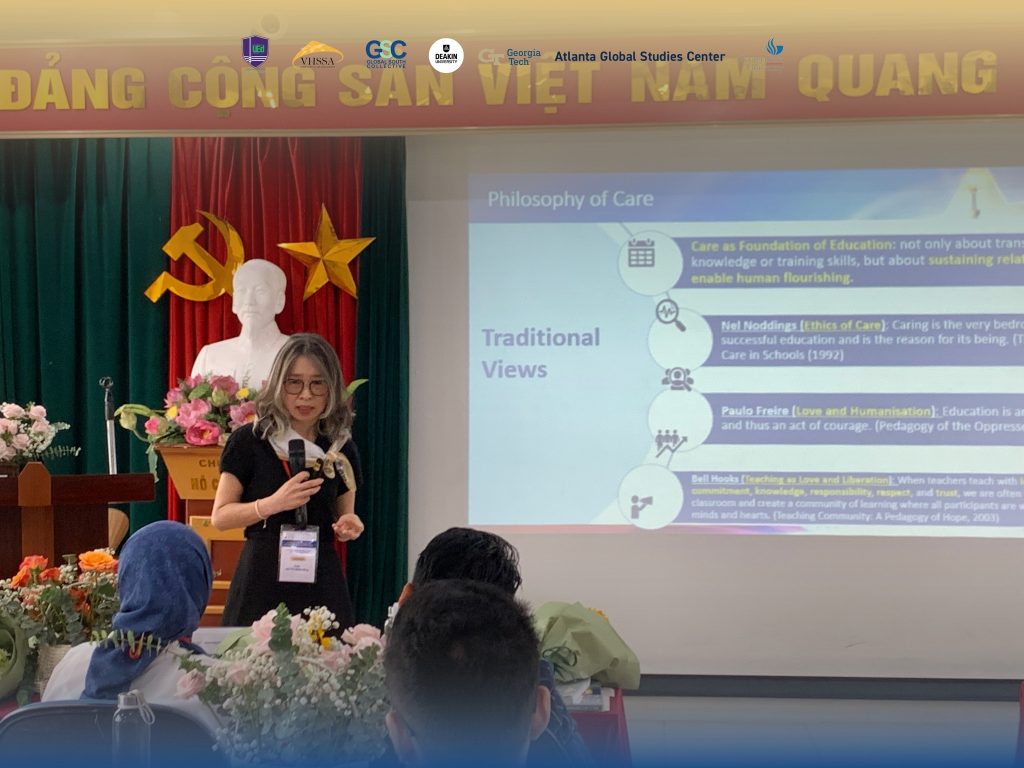
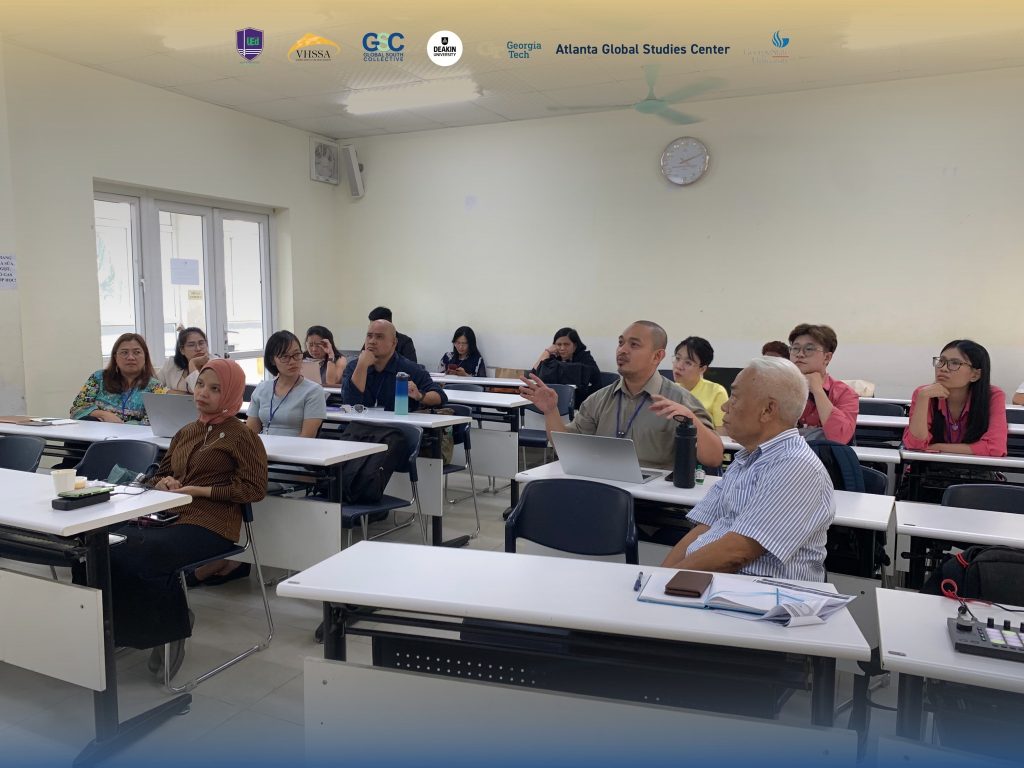
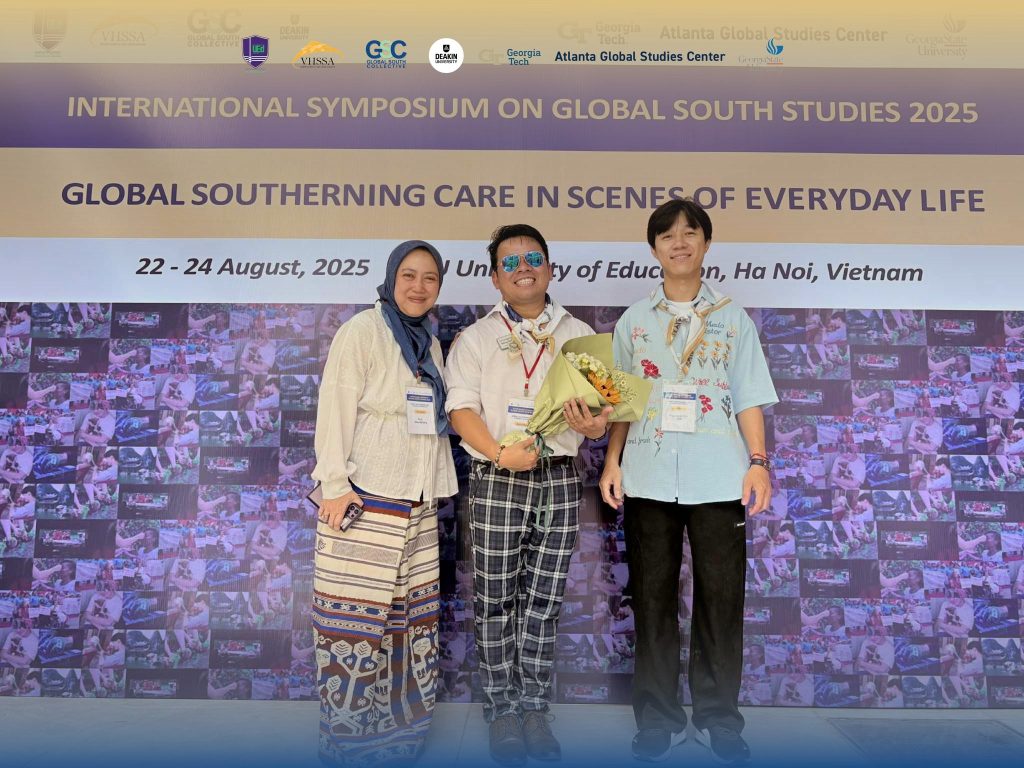
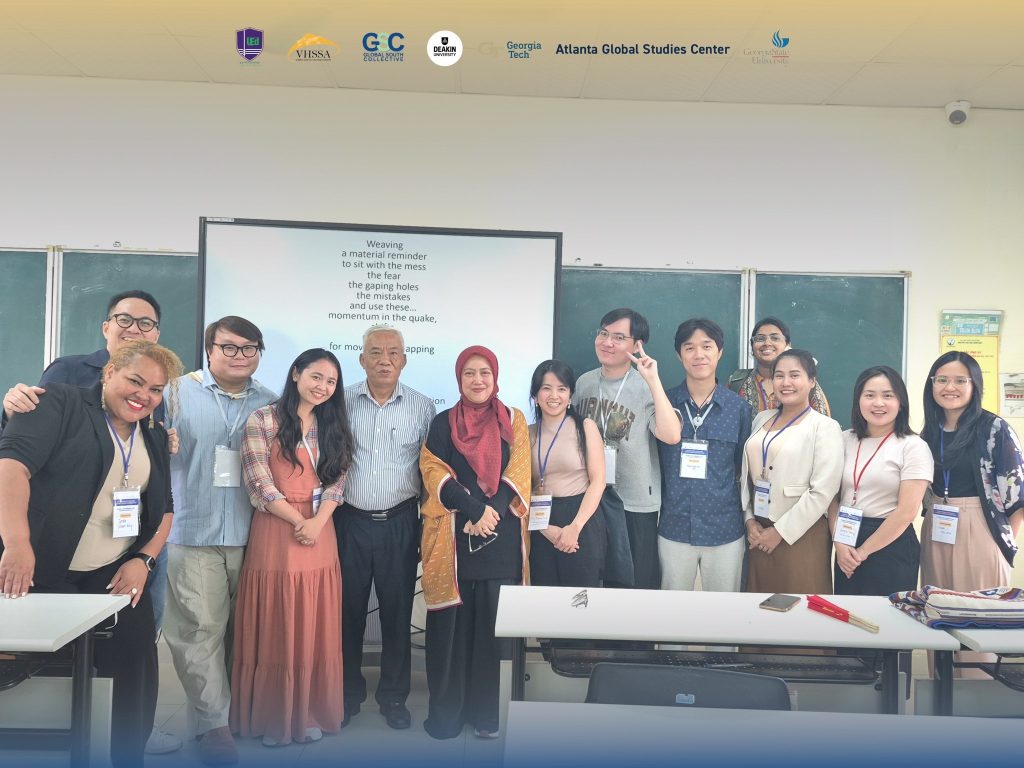
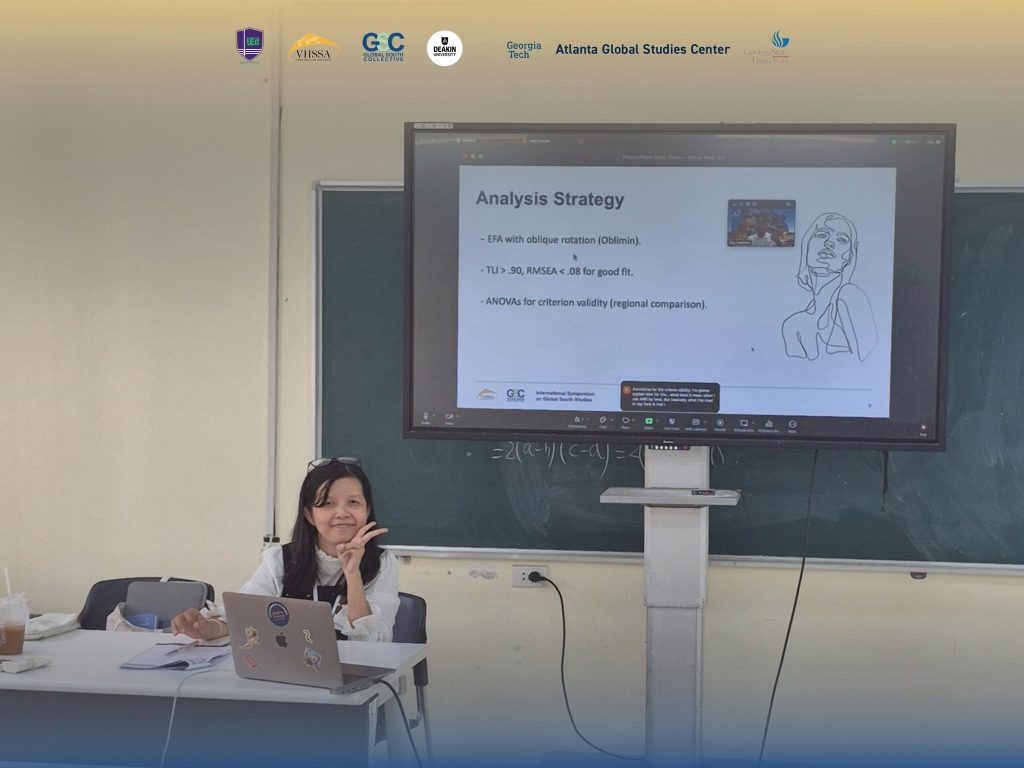
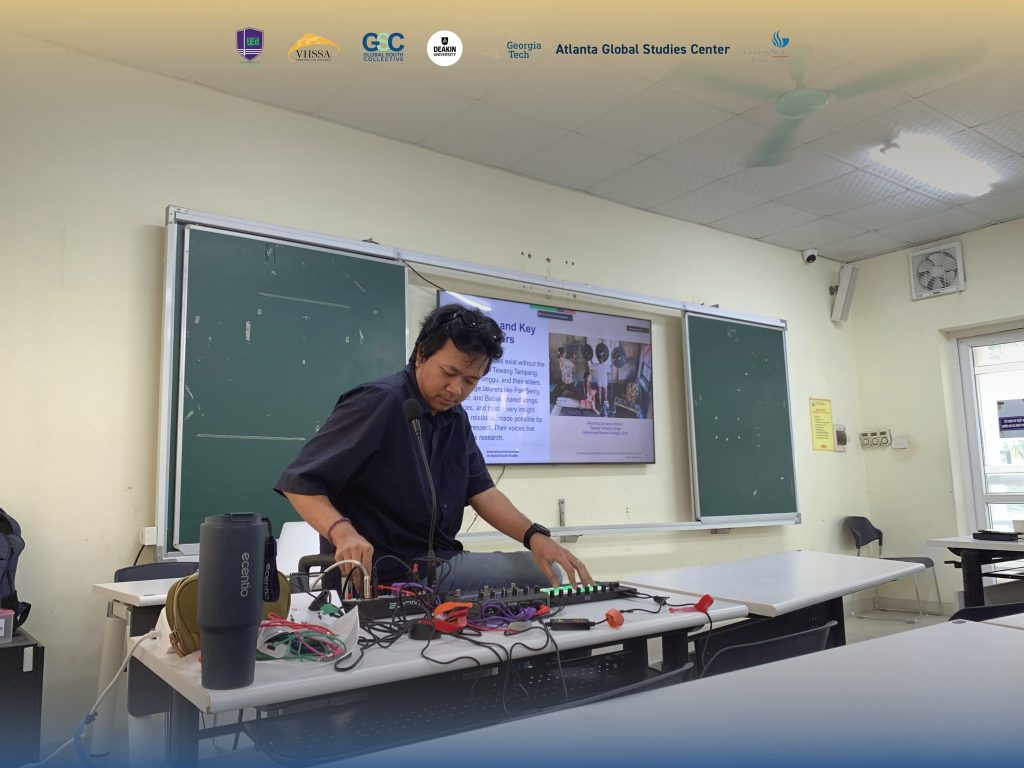
THE SECOND DAY OF THE GLOBAL SOUTH STUDIES SYMPOSIUM 2025
The second day carried forward the momentum from the opening, guiding participants through reflections on care across family, education, philosophy, publishing, and sustainable development.![]() The morning opened with a keynote by Dr. Tran Thanh Nam (Associate Professor in Clinical Psychology, Vice Provost, VNU–University of Education, Ha Noi) on “Vietnamese Parents’ Attitudes towards Behavioral Parent Training Program.” His talk invited practical discussions on how Vietnamese parents perceive and adapt parenting skills to manage children’s behavioral challenges within specific cultural contexts.
The morning opened with a keynote by Dr. Tran Thanh Nam (Associate Professor in Clinical Psychology, Vice Provost, VNU–University of Education, Ha Noi) on “Vietnamese Parents’ Attitudes towards Behavioral Parent Training Program.” His talk invited practical discussions on how Vietnamese parents perceive and adapt parenting skills to manage children’s behavioral challenges within specific cultural contexts.![]() Following this, Dr. Le Van Canh (Associate Professor, Tran Nhan Tong Institute of Vietnam National University, Vietnam) delivered his keynote “Reconstructing Care in Education From Buddhist Philosophy.” Drawing from compassion and Buddhist teachings, his presentation dialogued with contemporary concepts of care, inspiring audiences to imagine education as a more human-centered and sustainable practice beyond Western frameworks.
Following this, Dr. Le Van Canh (Associate Professor, Tran Nhan Tong Institute of Vietnam National University, Vietnam) delivered his keynote “Reconstructing Care in Education From Buddhist Philosophy.” Drawing from compassion and Buddhist teachings, his presentation dialogued with contemporary concepts of care, inspiring audiences to imagine education as a more human-centered and sustainable practice beyond Western frameworks.![]() In the Information Session, Dr. Vuong Tran (Nipissing University, Canada) introduced a publication opportunity with Emerald Publishing, offering valuable guidance to scholars interested in contributing book chapters on learning environments and Global Southern knowledges. Parallel sessions featured a rich range of presentations addressing diverse practices of care: from the intimacy of lullabies and maternal attachment, to the social pressures of contemporary motherhood, transnational caregiving on screen, and community-building workshops. Other talks explored teacher–student relationship quality, the emerging identity of Vietnamese “teacherpreneurs,” and the role of women entrepreneurs in promoting eco-social justice in the Mekong Delta. Together, these discussions highlighted care as both personal and collective, embedded in family, education, migration, and community contexts.
In the Information Session, Dr. Vuong Tran (Nipissing University, Canada) introduced a publication opportunity with Emerald Publishing, offering valuable guidance to scholars interested in contributing book chapters on learning environments and Global Southern knowledges. Parallel sessions featured a rich range of presentations addressing diverse practices of care: from the intimacy of lullabies and maternal attachment, to the social pressures of contemporary motherhood, transnational caregiving on screen, and community-building workshops. Other talks explored teacher–student relationship quality, the emerging identity of Vietnamese “teacherpreneurs,” and the role of women entrepreneurs in promoting eco-social justice in the Mekong Delta. Together, these discussions highlighted care as both personal and collective, embedded in family, education, migration, and community contexts.![]() In the afternoon, Professor Vina Adriany (Universitas Pendidikan Indonesia) presented her plenary “Teaching Pre-Service Teachers Critical Thinking: Weaving Hope and Resistance.” She emphasized critical thinking as a practice that nurtures hope while enabling resistance against imposed norms in teacher education. In parallel panels, scholars shared perspectives on doctoral students’ well-being, mentorship networks through social media, women caregivers in tuberculosis management, the epistemology of care among dialysis patients, and decolonial approaches to writing. These conversations broadened the view of care as a dynamic intersection of knowledge, pedagogy, and social practice in the Global South.
In the afternoon, Professor Vina Adriany (Universitas Pendidikan Indonesia) presented her plenary “Teaching Pre-Service Teachers Critical Thinking: Weaving Hope and Resistance.” She emphasized critical thinking as a practice that nurtures hope while enabling resistance against imposed norms in teacher education. In parallel panels, scholars shared perspectives on doctoral students’ well-being, mentorship networks through social media, women caregivers in tuberculosis management, the epistemology of care among dialysis patients, and decolonial approaches to writing. These conversations broadened the view of care as a dynamic intersection of knowledge, pedagogy, and social practice in the Global South.![]() The day concluded with the plenary by Dr. Nguyen Huu Cuong (Associate Professor, Interim Rector, Phuong Dong University, Vietnam), “Implementation of the Sustainable Development Goals in Vietnamese Higher Education.” His talk emphasized strategies for integrating the SDGs into governance and curricula in Vietnam. Simultaneously, panelists further expanded the theme of care through diverse lenses: politics of everyday care, new approaches to masculinity, cultural encounters with AI, healing practices in music, and antibiotic resistance in rural Vietnam. These exchanges connected theory and practice, underscoring the intertwined roles of care and sustainability in education and society today.
The day concluded with the plenary by Dr. Nguyen Huu Cuong (Associate Professor, Interim Rector, Phuong Dong University, Vietnam), “Implementation of the Sustainable Development Goals in Vietnamese Higher Education.” His talk emphasized strategies for integrating the SDGs into governance and curricula in Vietnam. Simultaneously, panelists further expanded the theme of care through diverse lenses: politics of everyday care, new approaches to masculinity, cultural encounters with AI, healing practices in music, and antibiotic resistance in rural Vietnam. These exchanges connected theory and practice, underscoring the intertwined roles of care and sustainability in education and society today.
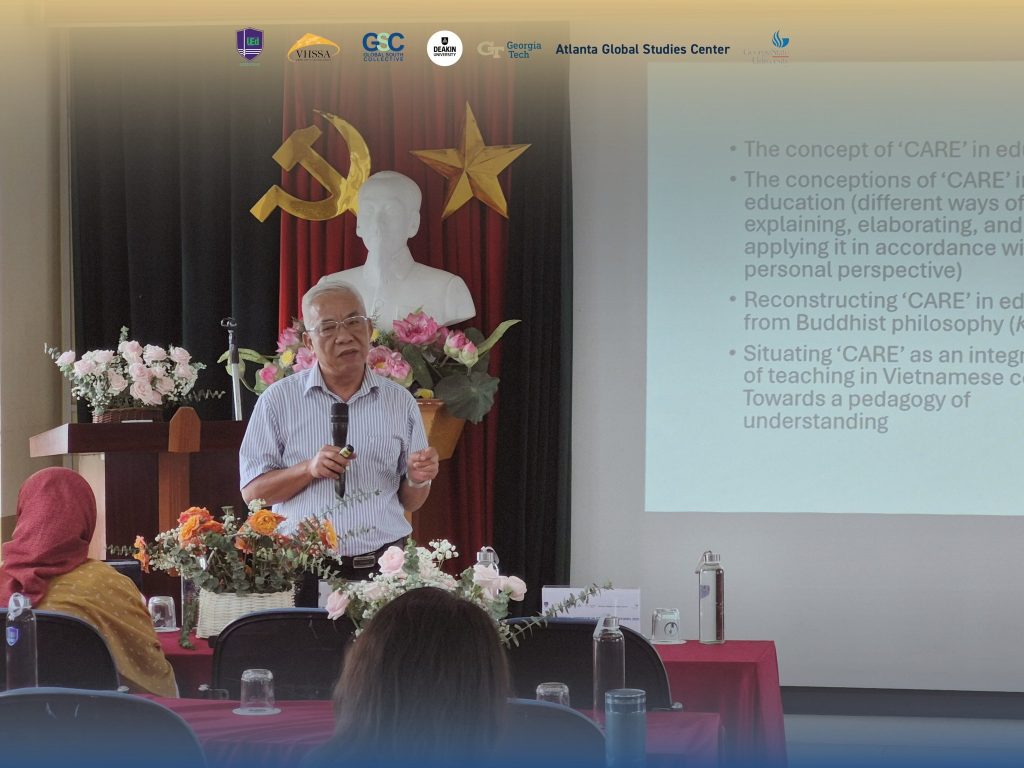
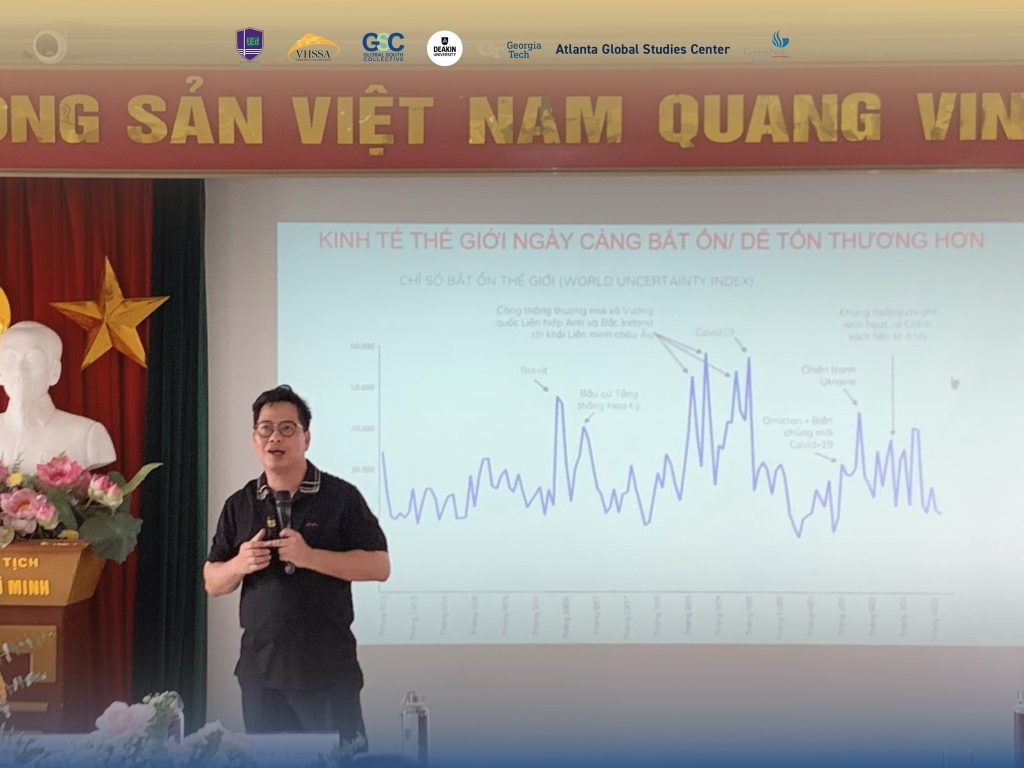
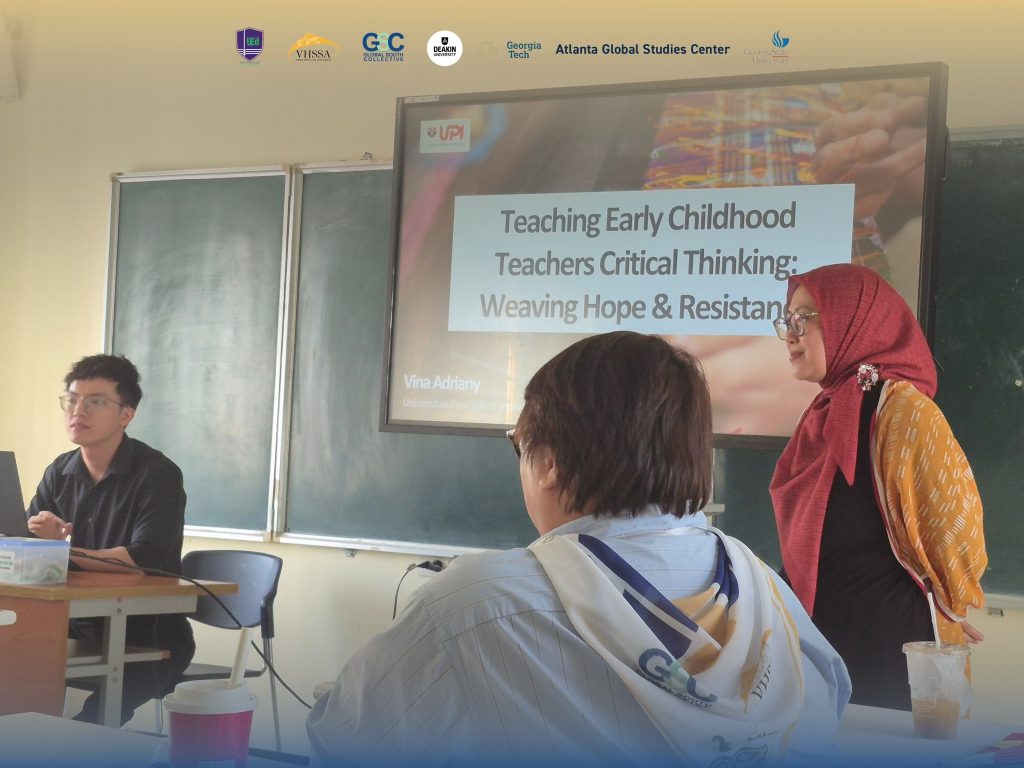
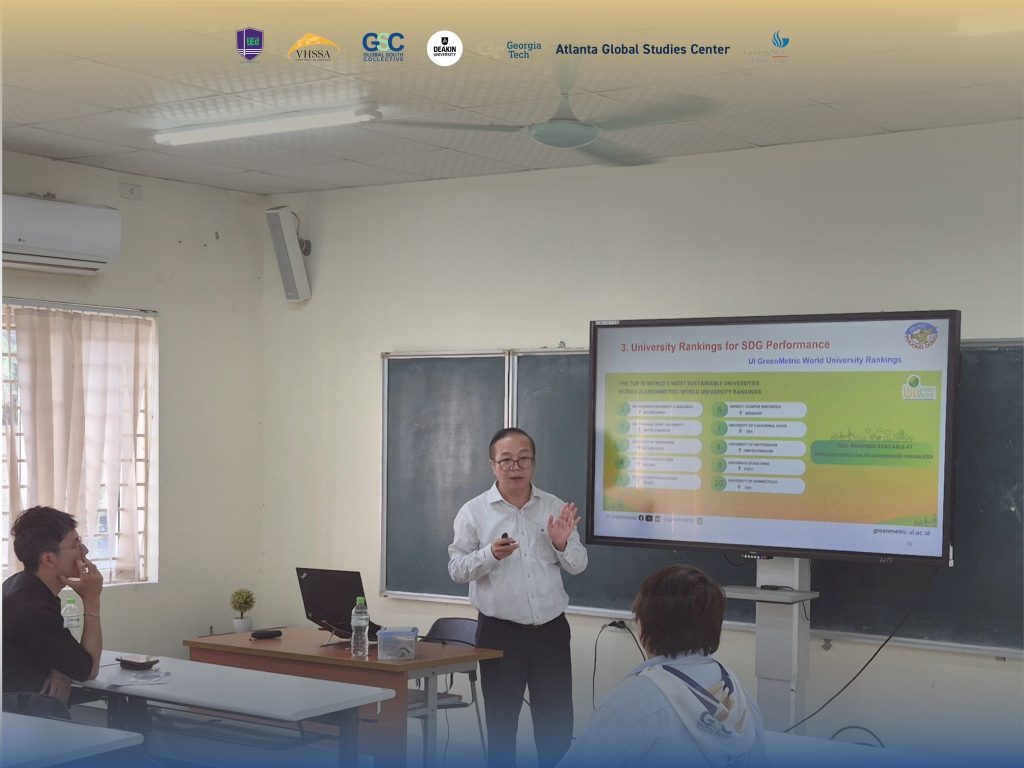
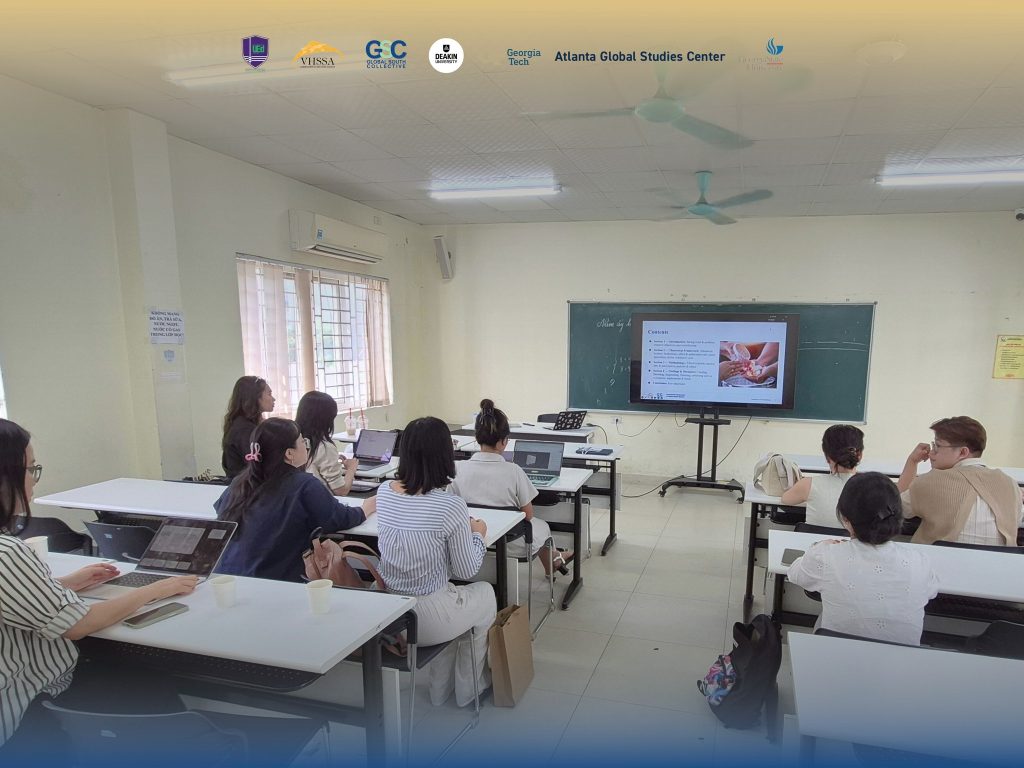
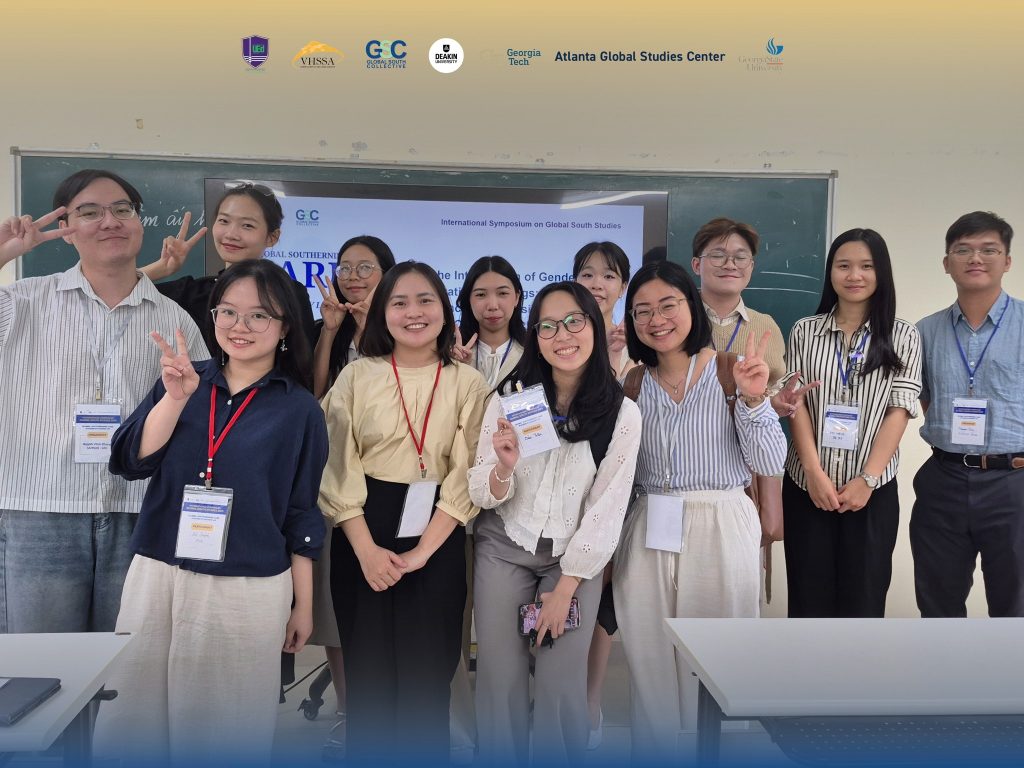
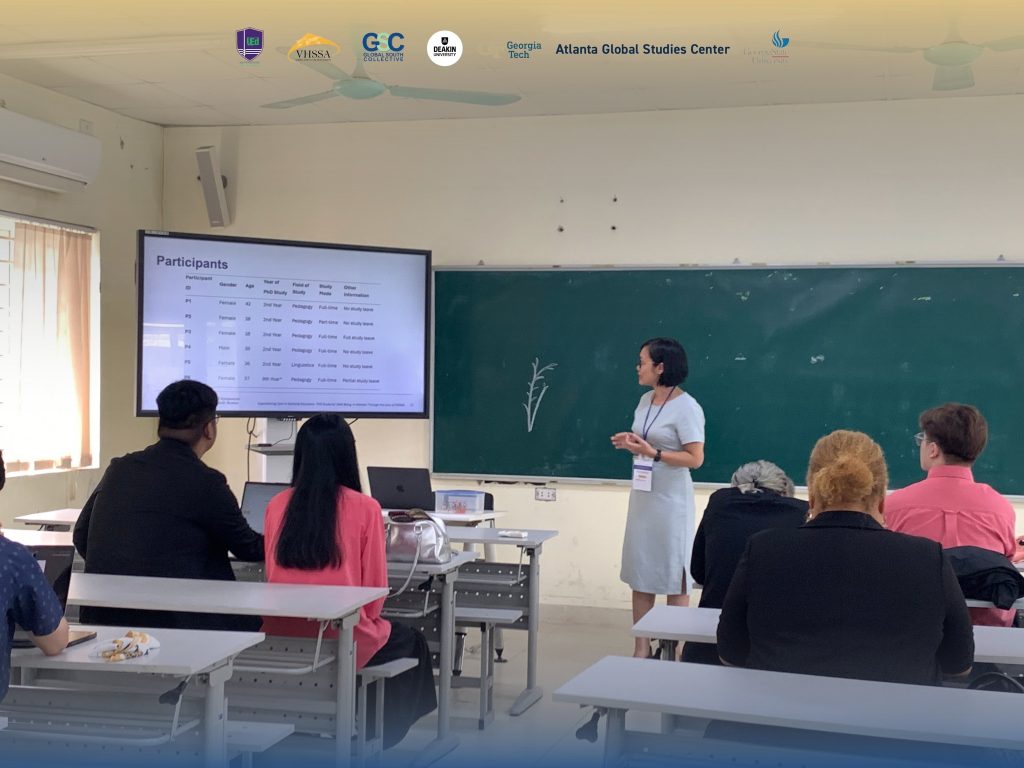
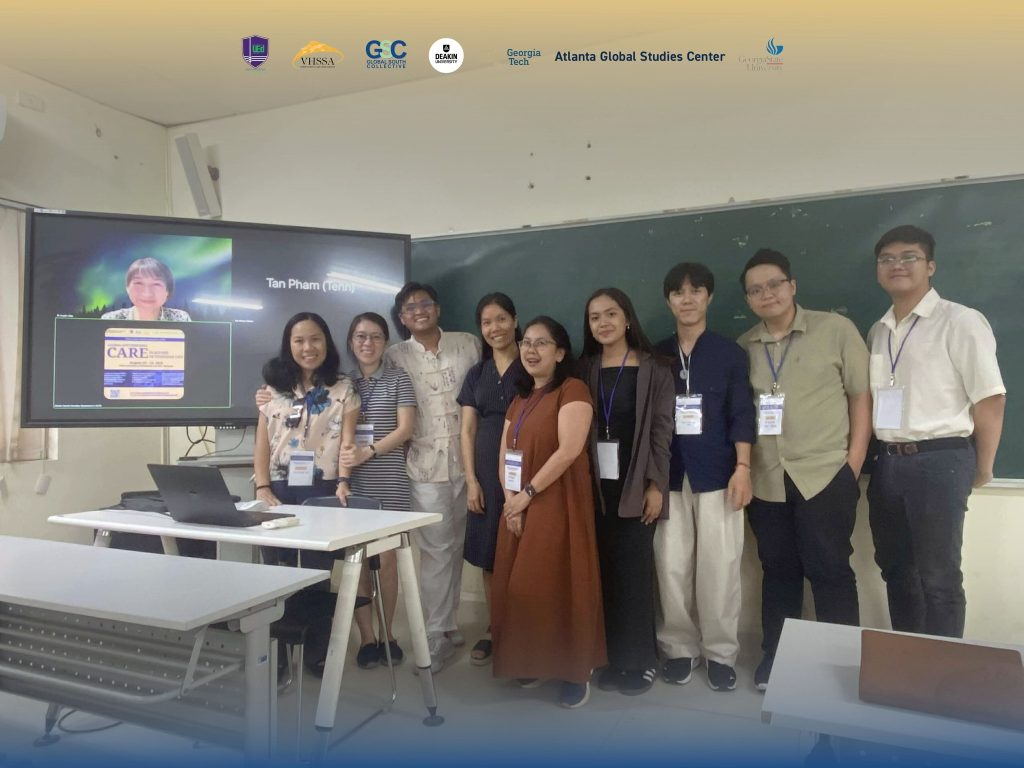
THE THIRD DAY OF THE GLOBAL SOUTH STUDIES 2025 SYMPOSIUM
The final day of the symposium began with a keynote address by Professor Isabelle Roskam (UCLouvain – Université catholique de Louvain, Belgium), delivered online under the theme “Parental Burnout: What is it and why does it matter?”. Her presentation offered profound insights into the phenomenon of parental burnout, explaining why it has become an increasingly pressing issue in contemporary society, while also suggesting directions for further research and practical interventions. The talk drew significant interest from participants, many of whom noted how closely the topic resonated with lived experiences and sparked new reflections for both scholarship and social practice.![]() The day continued with academic sessions where scholars and researchers exchanged findings, experiences, and diverse methodological approaches. Beyond advancing disciplinary knowledge, these discussions fostered interdisciplinary and interregional connections, enriching the shared intellectual landscape of the symposium.
The day continued with academic sessions where scholars and researchers exchanged findings, experiences, and diverse methodological approaches. Beyond advancing disciplinary knowledge, these discussions fostered interdisciplinary and interregional connections, enriching the shared intellectual landscape of the symposium.![]() In the first set of parallel sessions, presentations ranged from inclusive education and poetry as a form of healing and resistance to the cultural and social lives of fisherfolk, Khmer monastic traditions, and the commercialization of care in the Philippines and Thailand. Many studies highlighted the interconnections between care, identity, and cultural resilience within the Global South.
In the first set of parallel sessions, presentations ranged from inclusive education and poetry as a form of healing and resistance to the cultural and social lives of fisherfolk, Khmer monastic traditions, and the commercialization of care in the Philippines and Thailand. Many studies highlighted the interconnections between care, identity, and cultural resilience within the Global South.![]() The second block of sessions explored the intersections of technology, art, and care in contemporary life—from online art practices and digital caregiving, to questions of family, responsibility, and violence. These discussions not only opened critical perspectives but also suggested new avenues for research and social engagement.
The second block of sessions explored the intersections of technology, art, and care in contemporary life—from online art practices and digital caregiving, to questions of family, responsibility, and violence. These discussions not only opened critical perspectives but also suggested new avenues for research and social engagement.![]() The final block featured dynamic Pecha-Kucha presentations and roundtables, offering concise yet evocative insights on music, labor, education, and practices of care during the pandemic. Comparative studies on humor, social harmony, healthcare, and working conditions in Vietnam and China underscored both the challenges and the possibilities of imagining “caring futures” across the region. Notably, the Pecha-Kucha sessions not only introduced innovative research ideas but also fostered constructive feedback and collegial exchange, enabling presenters to refine and further develop their projects. From these diverse and in-depth exchanges, the symposium created a vibrant intellectual space where ideas converged and new directions for research emerged.
The final block featured dynamic Pecha-Kucha presentations and roundtables, offering concise yet evocative insights on music, labor, education, and practices of care during the pandemic. Comparative studies on humor, social harmony, healthcare, and working conditions in Vietnam and China underscored both the challenges and the possibilities of imagining “caring futures” across the region. Notably, the Pecha-Kucha sessions not only introduced innovative research ideas but also fostered constructive feedback and collegial exchange, enabling presenters to refine and further develop their projects. From these diverse and in-depth exchanges, the symposium created a vibrant intellectual space where ideas converged and new directions for research emerged.![]() The event concluded with Closing Remarks, wrapping up three days of productive and inspiring engagement. On the third day, the theme for next year’s symposium was revealed, generating excitement among scholars and opening new opportunities for future research and collaboration. The presentations, discussions, and connections formed throughout the journey left a lasting impression and opened up promising prospects for future collaborations and research.
The event concluded with Closing Remarks, wrapping up three days of productive and inspiring engagement. On the third day, the theme for next year’s symposium was revealed, generating excitement among scholars and opening new opportunities for future research and collaboration. The presentations, discussions, and connections formed throughout the journey left a lasting impression and opened up promising prospects for future collaborations and research.
